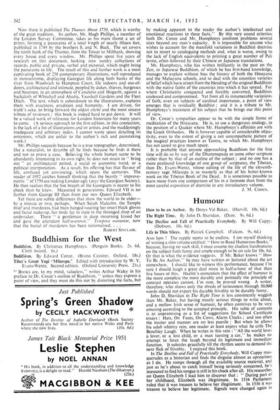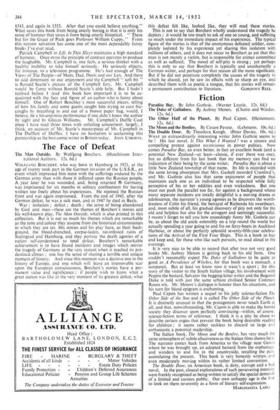Humour
Life in Thin Slices. By Patrick Campbell. (Falcon. 9s. 6d.)
AND how ! The supply seems to be endless. I am myself thinking of writing a slim volume entitled: " How to Read Humorous Books," because, having no such skill, I must assume my clueless lucubrations on the subject both funny and ample enough to be on sale for 10s. 6d. Or that is what the evidence suggests. If Mr. Baker knows " How To Be An Author," he may have written or lectured about the art somewhere. I should like to witness this performance, because I'm sure I should laugh a great deal more in half-a-hour of that than five hours of this. Hazlitt's contention that the effect of humour is the more complete the more durably and pointedly the principle of contrast operates cannot, I'm sure, be proved wrong. A writer, therefore, who shows only the shreds of seriousness through 50,000 words should not expect his durable frivolity to be durably funny.
John D. Sheridan in The Right Time is less consistently waggish than Mr. Baker, but having mostly serious things to write about, and a mellow Irish sense of humour, he often contrives to be very amusing according to the accepted principle. His table of contents is as unpromising as a list of suggestions for School Certificate 'essays : Hats, On Faces, On Cows, Alarm Clocks ; and too often the matter and manner are no less puerile : But when he allows his adult whimsy rein, one reader at least enjoys what he calls The Benchley Laugh. When he writes in this vein : "All the world loves a lover, or a lost child, or a man turning a car," he makes no attempt to force the laugh beyond its legitimate and immediate function. It subsides gracefully till the rhythm seems to. demand the next flick of frivolity. I enjoyed this book. In The Decline and Fall of Practically Everybody, Will Cuppy mas- querades as a historian and finds the disguise almost as uproarious as I do. He romps through all the available source material, and just as he's about to catch himself being seriously concerned, he's reassured to find his tongue is still in his cheek after all. His researches on Queen Elizabeth I lead him to discover that : " During part of her childhood, Elizabeth was illegitimate. In 1534 Parliament ruled that it was treason to believe her illegitimate. In 1536 it was treason to 'believe her legitimate. Signals were changed again in
1543, and again in 1553. After that you could believe anything." What saves this book from being utterly boring-is that it is only his sense of humour that saves it from being utterly historical. " There but for the Grace of Puck goes Professor William Cuppy." From this narrow salvation has come one of the-most dependably funny books I've ever read.
Patrick Campbell in Life In Thin Slices maintains a high standard of humour. Once more the principle of contrast operates to produce the laughable. Mr. Campbell is, one feels, a serious thinker with a healthy inability to take himself seriously. He seriously objects, for instance, to a television programme. He's had enough of The Views of The People—of Mum, Dad, Doris and our Len. And there to add dimension to our enjoyment and the Campbell " soft bit " is Ronald Searle's picture of the Campbell fury. Mr. Campbell would be funny without Ronald Searle's able help. But 1 hadn't realised before I read this book how important it is to be ac- quainted with the face and figure of an author who is funny about himself. One of Robert Benchley's most successful pieces, telling of how his family and some guests caught him trying to cure hic- coughs by breathing in and out of a brown paper bag, would, I believe, be a hit-and-miss performance if one didn't know the author by sight and by Gluyas Williams. Mr. Campbell's Duffle Coat piece I have read three times with unfailing amusement, largely, I think, on account of Mr. Searle's masterpiece of Mr. Campbell in The Dufflest of Duffles. I have no hesitation is acclaiming this partnership as the best comic writer in Britain today. JOHN USBORNE.











































 Previous page
Previous page